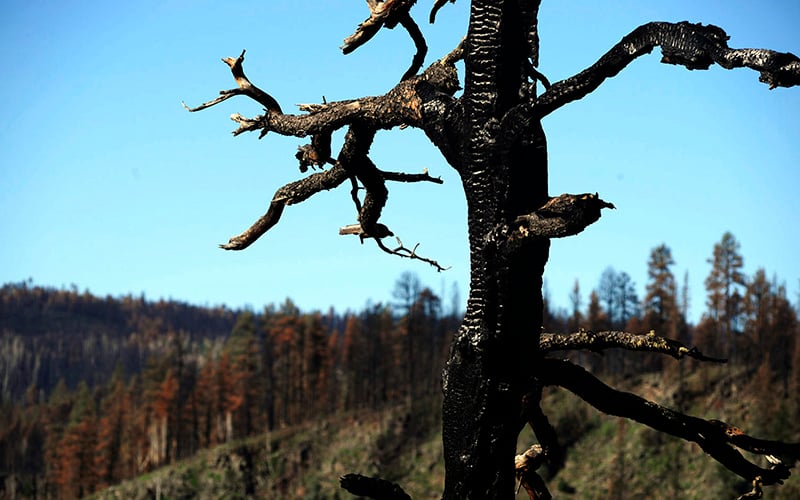
A charred tree in the aftermath of the 2011 Wallow Fire, the largest in state history. Charred hillsides opened the door to mudslides as rains followed the fire. (Photo by Brandon Quester)
WASHINGTON – A federal appeals court Friday ordered a new hearing for an Apache County homeowner who said her fire insurance policy should cover damages from a mudslide that destroyed her home after the 2011 Wallow wildfire.
A three-judge panel of the 9th U.S. Circuit Court of Appeals said a lower court needs to consider “whether the the mudslide that damaged (Magda) Stankova’s house was ‘directly’ caused by the fire.”
Attorneys for Metropolitan Property and Casualty Insurance Co., which had challenged Stankova’s claim, did not immediately return a call seeking comment Friday on the ruling.
But Stankova’s attorney welcomed the decision.
“My reaction is, very happy, and it’s a very good ruling for my client,” said Randy Sassaman, her Phoenix attorney.
The case began in the summer of 2011 after the Wallow Fire broke out in the Apache-Sitgreaves National Forest. The fire, which started May 29, would go on to become the largest wildfire in Arizona history, burning 538,049 acres before it was contained on July 8.
Stankova’s home in Alpine was not damaged in the blaze, but her detached garage was destroyed on June 13 and the fire “also destroyed all vegetation on a nearby hillside,” the court ruling said.
On Aug. 6, 2011, a mudslide on that hillside destroyed Stankova’s home. She filed claims under her homeowner’s policy with Metropolitan, first for the garage and later for the house.
The company covered the garage, saying fire damage was included in the policy.
But Metropolitan refused to pay for the house, citing exclusions i her policy for water damage and “earth movement.” It said that those were the “obvious, immediate and physical causes” of the damage to her home, not the fire.
Stankova disagreed, saying the fire led to the mudslide. She said there was no evidence her home, which she had owned since 1998, had ever been damaged by mudslides or flooding.
Stankova sued. But a federal district judge granted summary judgment in favor of Metropolitan, ruling that, under Arizona law, a mudslide could not have been “directly” caused by a fire that was put out a month earlier.
The appellate court, however, said Arizona law “requires a broader interpretation of direct causation.”
“The evidence before us is limited, but the district court erred in concluding that, under Arizona law, the insurer was entitled to summary judgment,” said the appellate opinion. “There is a triable issue as to whether the fire directly caused the destruction of Stankova’s home.”
It reversed the lower court ruling and sent the case back for further hearings.
Sassaman said he thinks Stankova has “excellent chances” in her next hearing before the district court.